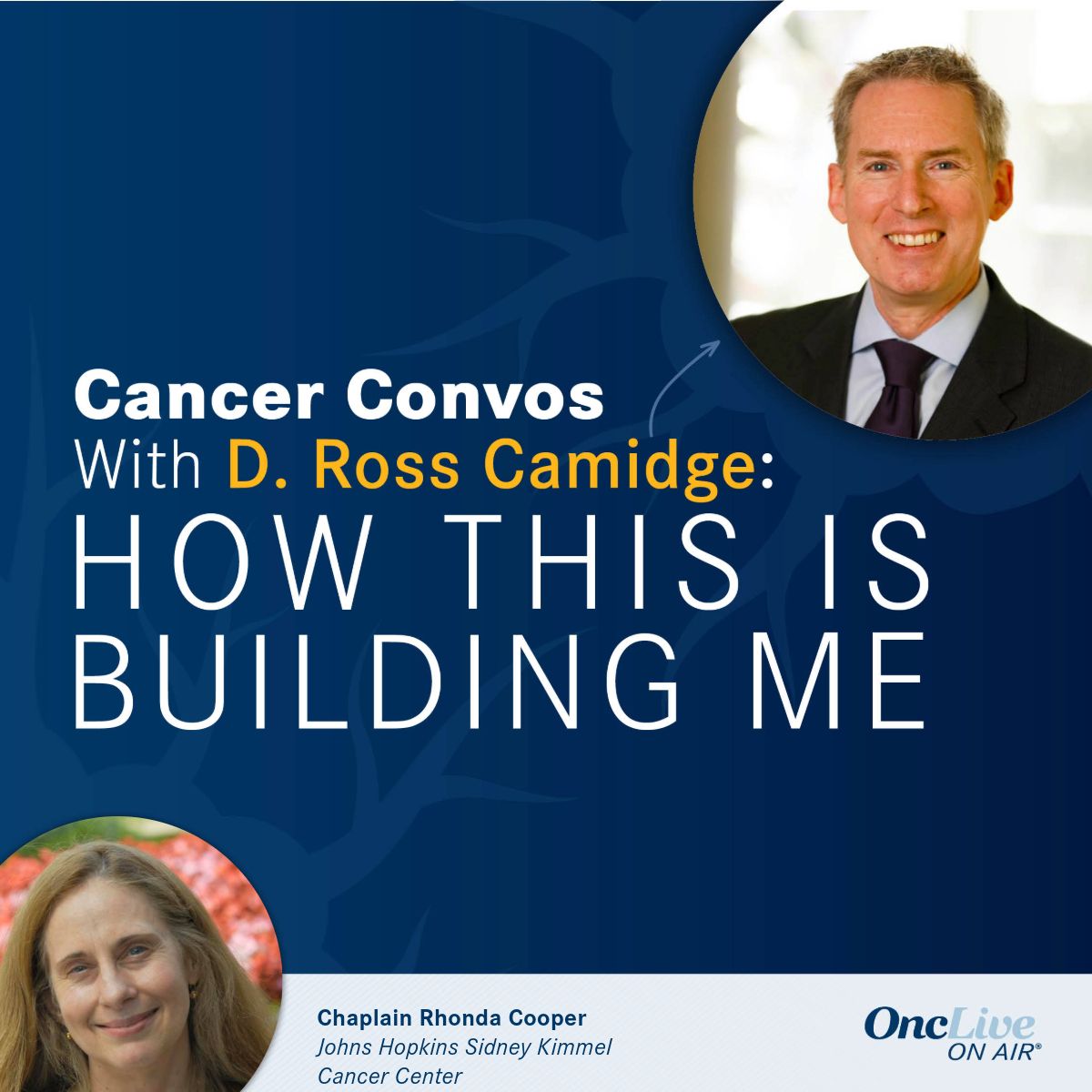Commentary
Article
Unique Molecular Profiles of Biliary Tract Cancers Drive Continued Development of Targeted Therapies
Author(s):
The mitigation and management of toxicities is a key component of treating patients with biliary tract cancers with targeted therapies.
Marina Baretti, MD

The heterogeneity of biliary tract cancers necessitates molecular profiling for all patients with these malignancies, and there is continued focus on developing therapies for validated therapeutic targets and those that are emerging, according to Marina Baretti, MD, who added that the optimal use of these therapies requires proactive management of associated toxicities.
“Biliary tract cancers are being classified more and more based on a specific molecular profiling, with a higher rate of potentially actionable alterations seen in the intrahepatic cholangiocarcinoma subtype. Precision medicine applies to all patients with biliary tract different cancers,” Baretti said during a presentation at the 41st Annual CFS®. Baretti is an assistant professor of medical oncology at the Sidney Kimmel Comprehensive Cancer Center of Johns Hopkins Medicine in Baltimore, Maryland.1
In her presentation, Baretti highlighted targeted therapies that have been developed for the treatment of patients with cholangiocarcinoma and other biliary tract cancers, provided insights on the management of toxicities associated with these approaches, and outlined novel targets that could lead to the development of additional options.
Different subsets of biliary tract cancers have different molecular profiles, Baretti noted. For example, intrahepatic cholangiocarcinoma presents with a unique profile compared with extrahepatic cholangiocarcinoma or gallbladder cancer. She explained that up to 70% of patients with biliary tract cancers harbor an actionable alteration.
IDH1 Mutations
Up to 20% of patients with intrahepatic cholangiocarcinoma harbor IDH1 mutations. In August 2021, the FDA approved ivosidenib (Tibsovo) for the treatment of adult patients with previously treated, locally advanced or metastatic cholangiocarcinoma harboring an IDH1 mutation, as detected by an FDA-approved test.2
That approval was supported by findings from the phase 3 ClarIDHy study (NCT02989857), which demonstrated that ivosidenib given at a once-daily dose of 500 mg in continuous 28-day cycles (n = 126) led to a statistically significant improvement in progression-free survival (PFS) vs placebo (n = 61; HR, 0.37; 95% CI, 0.25-0.54; P < .0001).3
Adverse effects (AEs) reported in safety-evaluable patients who received ivosidenib (n = 121) were generally grade 1/2, and the most common grade 1/2 toxicities consisted of nausea (33%), diarrhea (31%), fatigue (23%), cough (21%), abdominal pain (19%), and anorexia (17%).
Treatment-related AEs (TRAEs) led to dose reductions in 4.1% of patients, and the most common of which were QTc prolongation and peripheral neuropathy. Twenty-nine percent of patients treated with ivosidenib experienced TRAEs that required dose interruptions, the most common of which included increased aspartate aminotransferase, increased alanine aminotransferase, increased bilirubin, ascites, and fatigue. TRAEs led to treatment discontinuation for 2% of patients, with the most common toxicity being acute kidney injury.
Although patients with advanced IDH1-mutated cholangiocarcinoma have a targeted treatment option, secondary IDH1 resistance mutations and isoform switching can lead to acquired resistance to ivosidenib, according to Baretti. The potent, selective, and covalent IDH1 R132 inhibitor, LY3410738, could represent another therapeutic option for this patient population, she said. LY3410738 has a unique binding site outside the dimer interface, enabling activity in the presence of common second-site IDH1 mutations.4
FGFR2 Fusions/Rearrangements in Intrahepatic Cholangiocarcinoma
Approximately 13% to 16% of patients with intrahepatic cholangiocarcinoma harbor FGFR2 fusions or rearrangements. In April 2020, the FDA granted accelerated approved to pemigatinib (Pemazyre) for the treatment of patients with previously treated, locally advanced or metastatic cholangiocarcinoma with FGFR2 fusions or rearrangements, as detected by an FDA-approved test.5
In the open-label, single-arm, phase 2 FIGHT-202 trial (NCT02924376), patients in cohort A with FGFR2 fusion– or rearrangement–positive cholangiocarcinoma (n = 108) achieved an overall response rate (ORR) of 37% (95% CI, 28%-47%), including complete response (CR) and partial response (PR) rates of 3% and 34%, respectively, at a median follow-up of 42.9 months (range, 19.9-52.2). The disease control rate was 82% (95% CI, 74%-89%), and the median duration of response was 9.1 months (95% CI, 6.0-14.5). These patients experienced a median PFS of 7.0 months (95% CI, 6.1-10.5) and a median overall survival (OS) of 17.5 months (95% CI, 14.4-22.9).6
Another targeted agent entered the treatment paradigm when the FDA granted accelerated approval to futibatinib (Lytgobi) for the treatment of adult patients with previously treated, unresectable, locally advanced or metastatic intrahepatic cholangiocarcinoma harboring FGFR2 gene fusions or other rearrangements in September 2022.7
Findings from the open-label, single-arm, phase 2 FOENIX*-CCA2 trial (NCT02052778) showed that evaluable patients (n = 103) experienced an ORR of 42% (95% Cim 32%-52%), a DCR of 83% (95% CI, 74%-89%), and a median DOR of 9.7 months (95% CI, 7.6-17.0). The median PFS and OS were 9.0 months (95% CI, 6.9-13.1) and 21.7 months (95% CI, 14.5-not evaluable [NE]).8
The most common AE observed with both pemigatinib and futibatinib is hyperphosphatemia, which is the most common on-target effect of FGFR inhibition, Baretti noted. Hyperphosphatemia can lead to tissue mineralization, calcinosis cutis, calciphylaxis, and vascular calcification.
Baretti outlined the strategies for the management of hyperphosphatemia associated with FGFR inhibition, noting that monitoring serum phosphate levels at baseline and during the course of treatment is crucial. If a patient’s phosphate level exceeds 5.5 mg/dL, switching them to a low-phosphorous diet or initiating a phosphate-lowering therapy is advised, Baretti said. Dose adjustments of the FGFR inhibitor could also be used.
Dermatologic toxicities are also associated with FGFR inhibition, and these AEs can be mitigated by moisturizing the skin; keeping nails short and unpolished; using good oral hygiene; avoiding prolonged contact with water; and avoiding excessive soaps or detergents.
Additionally, baseline and monthly ophthalmologic exams are recommended for patients to monitor for ocular toxicities. Those who experience asymptomatic ocular AEs and are stable could continue on their current dosage of treatment; however, lowering the dose is advisable for patients who experience symptoms or worsen on serial exams, Baretti explained. If symptoms do not improve with dose reductions, treatment can be permanently discontinued.
“The [AE] profiles [of FGFR inhibitors] can also be influenced by the different binding affinity towards the [FGFR] receptors,” she added.
The novel, selective FGFR2 inhibitor lirafugratinib (RLY-4008) has displayed signs of efficacy and safety in patients with advanced FGFR2-altered cholangiocarcinoma. Patients naive to a FGFR inhibitor who were treated across all doses of lirafugratinib (n = 38) as part of the phase 1/2 ReFocus trial (NCT04526106) experienced a confirmed ORR of 57.9%. Additionally, those given the agent at 70 mg per day (n = 17) achieved an ORR of 82.4%.9
At the 70-mg dose, the most common TRAEs included stomatitis (42%), nail toxicities (43%), and palmar-plantar erythrodysesthesia (35%). “The beauty of [lirafugratinib] is that it is a very selective FGFR2 inhibitor, so you do not have activity on FGFR1 or FGFR4, [and we have seen] much less hyperphosphatemia and gastrointestinal toxicity,” Baretti noted.
Other Actionable Targets
Beyond FGFR alterations and IDH1 mutations, targets such as BRAF mutations and HER2 expression serve as actionable biomarkers in cholangiocarcinoma, and additional actionable targets are on the way, according to Baretti.
She concluded her presentation by underscoring that the continued integration of targeted therapy into the treatment paradigm for patients with biliary tract cancers will be crucial, and the use of circulating tumor DNA will also help inform treatment decisions.
“The AE profiles [of targeted therapy] are different from the classic cytotoxic chemotherapy; however, usually you can see that these are not life-threatening AEs,” Baretti said. “Nevertheless, AEs need careful monitoring, and that can translate into minimal need for dose interruptions or reductions.”
Editor’s note: Dr Baretti reported grant/research support paid to Johns Hopkins from Merck and serving in a consulting role for Exelixis, Incyte, and AstraZeneca.
References
- Baretti M. Targeted therapies and toxicity management for cholangiocarcinoma. Presented at: 41st Annual CFS®; November 8-10, 2023; New York, NY.
- FDA approves ivosidenib for advanced or metastatic cholangiocarcinoma. FDA. August 25, 2021. Accessed November 9, 2023. https://www.fda.gov/drugs/resources-information-approved-drugs/fda-approves-ivosidenib-advanced-or-metastatic-cholangiocarcinoma
- Abou-Alfa GK, Macarulla T, Javle MM, et al. Final results from ClarIDHy, a global, phase 3, randomized, double-blind study of ivosidenib (IVO) versus placebo (PBO) in patients (pts) with previously treated cholangiocarcinoma (CCA) and an isocitrate dehydrogenase 1 (IDH1) mutation. J Clin Oncol. 2021;39(suppl 15):4069. doi:10.1200/JCO.2021.39.15_suppl.4069
- Cleary JM, Rouaisnel B, Daina A, et al. Secondary IDH1 resistance mutations and oncogenic IDH2 mutations cause acquired resistance to ivosidenib in cholangiocarcinoma. NPJ Precis Oncol. 2022;6(1):61. doi:10.1038/s41698-022-00304-5
- FDA grants accelerated approval to pemigatinib for cholangiocarcinoma with an FGFR2 rearrangement or fusion. FDA. April 17, 2020. Accessed November 9, 2023. https://www.fda.gov/drugs/resources-information-approved-drugs/fda-grants-accelerated-approval-pemigatinib-cholangiocarcinoma-fgfr2-rearrangement-or-fusion
- Vogel A, Sahai V, Hollebecque A, et al. Pemigatinib for previously treated locally advanced or metastatic cholangiocarcinoma: Final results from FIGHT-202. Ann Oncol. 2022;33(suppl 4):S379. doi:10.1016/j.annonc.2022.04.443
- FDA grants accelerated approval to futibatinib for cholangiocarcinoma. FDA. September 30, 2022. Accessed November 9, 2023. https://www.fda.gov/drugs/resources-information-approved-drugs/fda-disco-burst-edition-fda-approval-lytgobi-futibatinib-adult-patients-previously-treated
- Goyal L, Meric-Bernstam F, Hollebecque A, et al. Updated results of the FOENIX-CCA2 trial: efficacy and safety of futibatinib in intrahepatic cholangiocarcinoma (iCCA) harboring FGFR2 fusions/rearrangements. J Clin Oncol. 2022;40(suppl 16):4009. doi:10.1200/JCO.2022.40.16_suppl.4009
- Schram AM, Subbiah V, Liao C-Y, et al. Clinical activity of lirafugratinib (RLY-4008), a highly selective FGFR2 inhibitor, in patients with advanced FGFR2-altered solid tumors: the ReFocus study. Presented at: 2023 AACR-NCI-EORTC International Conference on Molecular Targets and Cancer Therapeutics; October 11-15, 2023; Boston, MA. https://relaytx.com/wp-content/uploads/2023/10/Schram-ENA-2023-Lirafugratinib-Oral-Presentation.pdf








